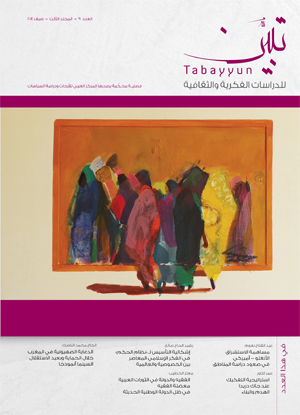The ACRPS has released the summer 2014 issue of Tabayyun, a peer reviewed Arab language quarterly devoted to philosophy and cultural studies. Edited by Azmi Bishara, and now in its second year of publication, this is the ninth issue of the journal.
This edition opens with Abdulfattah Naoum’s “Anglo-American Orientalism’s Contribution to the Rise of Regional Studies”, addressing the critical transformation occurring in the aftermath of the Second World War which saw a dramatic rise in regional studies. In a novel contribution to the prevalent discourse on Orientalism, Naoum notes how in contrast to the prolific critique of Orientalism, the critique of regional studies has been neglected. In “Jacques Derrida’s Strategy of Deconstruction: Demolish and Build” Omar Altawur analyzes how Jacques Derrida invoked the strategy of deconstruction to carry out a two-fold task in modern philosophical thought, a mission based on demolition and reconstruction. The author here offers a thorough analysis of Derrida’s attempt to undermine the “metaphysics of presence”. Rachid Al Hajj Saleh sets out in “Problems Surrounding the Institution of a System of Governance in the Particularist and Universalist Currents in Modern Islamic Thought” to examine the conflict between the establishment of a state that is at once Islamic and civil; in other words, the establishment of a system of government which blends the values of Islam and those of global political modernity.

Syrian academic and physician Mutazz Al Khateeb contributes a paper titled “The dilemma of the Islamic Jurist in the Modern Nation State” in which he argues that the predicament faced by contemporary Islamic jurisprudents currently arises from their relationship with the modern nation-state, which exists in complete isolation from the legacy of Islamic jurisprudence. This reality, argues Al Khatib, has created a division within jurisprudents which pits revolutionary jurisprudents against traditionalists, a division that has been further exacerbated with the arrival of the Arab Spring. Mohammed Al Nasik provides the final essay in Tabayyun’s ninth issue titled “Zionist Propaganda in Morocco during the Protectorate and Following Independence: Cinema as an Example” where he observes how cinema was utilized as one of the Zionist movement’s most successful propaganda tool at a time when Morocco was afflicted with high illiteracy rates.
Finally, the regular “From the Library” section contains an extract from chapter sixteen of the Arabic translation of Eric Hobsbawm’s Fractured Times: Culture and Society in the Twentieth Century, soon to be published by the ACRPS. In “Book Reviews,” Mohammed Bouazza discusses “Edward Said Deconstructing the Imperial Narrative: From the Aesthetics of Representation to the Politics of Representation” and Shams al Din Alkilani writes on “Burhan Ghalioun: From a Critique of the Modern State to the Critique of Contemporary Islamists’ Understanding of the State”. Also featured is Ibrahim Omari’s “In Between: The Challenge of Writing Fiction and the Horizon of Critical Reading” and Rabih Tabjoun’s “The Quest for Subject and Meaning in the Novel Valley of Darkness, a novel by Abdulmalak Murtad”.
To find copies of this, earlier editions of Tabayyun and other ACRPS periodicals, visit the ACRPS bookstore here (link in Arabic).